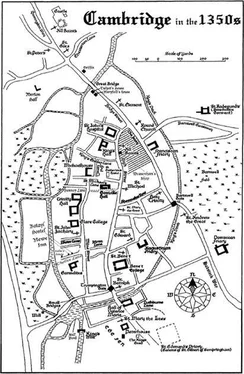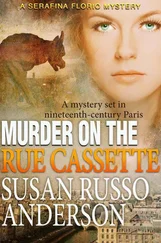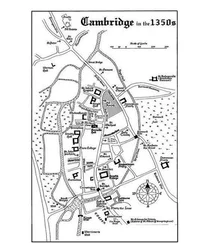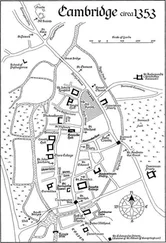Susanna Gregory
MURDER BY THE BOOK
2012

Poitiers, September 1356
On a warm autumn morning, two armies faced each other across a gently rolling plain. A pretty wood lay behind the English troops, its trees already turning from green to gold. There was a river nearby, too, where a heron stalked, hunting fish in the gurgling shallows. The sun shone, bees hummed and the air was full of birdsong. The scene was peaceful and idyllic.
Suddenly, trumpets brayed to announce a French attack, and the sounds of innocent morning were lost amid a thundering tattoo of charging hoofs and bloodcurdling war cries. Arrows hissed from Welsh and English longbows, quickly followed by the screams of the wounded. Eventually, there was another sound, too, one that startled the French warhorses, and made them buck and rear. It was the staccato bark of the Prince of Wales’s newfangled artillery.
The Sire de Rougé watched from the French right flank, cursing as smoke billowed across the field, making it difficult for him to see what was happening. He had heard of the device known as the ribauldequin, which used exploding powder to discharge several missiles simultaneously, but he had never seen one in action. He had hoped he never would – he considered them an abomination beyond belief, and so did every other right-thinking warrior.
There was a bright flame in the wood, followed by a much louder boom. He narrowed his eyes, straining for a glimpse of the things, but they were too well concealed. There was a fire, though, and he could see the English rushing to put it out. It burned only briefly, but that particular weapon did not speak again. Rougé assumed it had blown up – the cursed inventions might be terrifying to the opposition, but they were equally capable of killing their operators.
He itched to join in the affray. Unfortunately, the previous day, King Jean had informed him that he was unlikely to be needed – a French victory was a certainty, because they outnumbered the enemy three to one. They would, Jean had stated confidently, kill or rout them all, and the English would never set hostile feet in France again. Rougé and his small unit of horsemen were to remain in reserve, and not to deploy unless specifically ordered to do so.
The French army had three main divisions. The strongest and best was commanded by Jean himself, while his son the Dauphin and the Duke of Orléans led the others. When the smoke cleared, Rougé saw that the Dauphin had attacked first, but it had been a long dash towards the English position, especially wearing heavy armour and under a constant hail of arrows, and their bold charge had lost its impetus by the time they reached their goal. They had turned to retreat, but immediately became entangled with Orléans’s troops, who were marching up behind. Panic and chaos ensued, and now both units were stumbling from the field in disarray.
Rougé gripped his reins so hard that his knuckles were white, and his heart thudded wildly as King Jean stood up in his stirrups and raised his arm to signal the advance of his own division. Immediately, the great mass of knights and men-at-arms began to trot forward. They were the cream of the French army, and a splendid sight with their streaming pennants and the sunlight glinting off their polished helmets. Rougé began to relax. No grubby English rabble could withstand such a powerful force, and Jean had been right to brag of success that day.
To quell an almost overwhelming urge to race into the affray regardless of orders, Rougé pondered the English artillery again. First, there were the squat, malignant ‘bombards’, which sent stone balls careening into enemy lines. And second, there were the newer, lighter ribauldequins. These were wildly inaccurate, and their spluttering fire was making no difference to the battle one way or the other, yet Rougé could see their potential. Not only were the flames, noise and smoke unnerving, especially to horses, but it would not take much to adapt them into something truly deadly.
His musings were interrupted by a flurry of activity along the English lines: the archers had run out of arrows, and were snatching up hammers and daggers instead. Rougé sneered his disdain. It was an act of desperation, as such paltry weapons were no match for the great broadswords wielded by the French knights – and there were a great many of those in the proud wave that was pounding magnificently forward. But he detected another movement, too, in the woods to his left, where the Prince of Wales had stationed his Gascon cavalry.
There was a tremendous clash as the two armies met, followed by an indescribable cacophony of screams and howls. The spiteful clap of the ribauldequin sounded again, and more smoke drifted across his line of vision. Rougé leaned forward in his saddle, straining his eyes against the billowing whiteness. Just when it thinned, the ribauldequin cracked out yet again and Rougé gave up trying to see what was happening. To distract himself, he thought about the circumstances that had brought the two countries to war in the first place.
It was all to do with who should be King of France. Edward III of England thought it should be him – his great-grandfather had held the title, and Edward was the only legitimate offspring of that particular bloodline. Unfortunately for him, no French noble wanted an Englishman as his monarch, and most of the country supported the House of Valois. The dispute had dragged on for almost three decades already, and although Edward now preferred the comfort of his palaces to a campaign tent, his son was full of fervour for his birthright. For months now, the Prince of Wales had been leading a ragtag army across France, leaving a trail of death and destruction wherever he went. It was, thought Rougé bitterly, high time that bellicose pup was sent packing with his tail between his legs.
Suddenly he became aware that battle cries had given way to cheers. He smiled: Jean had won, and France would soon be free of the brutal marauders. Then the smoke thinned, and his grin faded. The victory had been won at a terrible price – the ground was littered with French dead, their pennants trampled and filthy underfoot, and their bright armour foul with dirt and blood. Then he frowned, as more of the smoke blew away.
The tight, glorious mass of Jean’s division was gone, and in its place was disorganised, shattered confusion. A few knights fought in isolated clumps, but the majority were running for their lives. With a shock that made him gasp his horror, Rougé saw that it was not the French who were cheering, but the English! Worse, he could see Jean battling for his life, virtually alone and beset on all sides by the enemy.
Appalled, Rougé called his men to order and galloped towards him. All around, English, Welsh and Gascon warriors were howling their triumph, but he thundered on, riding over anyone who tried to stop him. An arrow killed his horse from under him, but he rolled away from its body and continued on foot, sword in one hand and shield in the other. His men, he realised dully, were no longer with him; they had seen that the situation was hopeless, and had quit the field while they could.
He stumbled forward. Jean was not far away now, a sharp flash of silver armour amid a sea of rough brown leather jerkins. Then the unthinkable happened. Jean put up his sword, and handed his glove to some minor knight in a grimy surcoat. The King had surrendered! Stunned, Rougé staggered to a standstill, and was too shocked to resist as he was relieved of his weapons and bundled away to sit with the other prisoners.
Читать дальше













